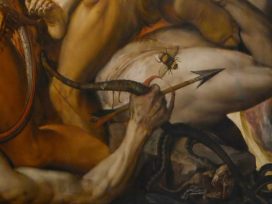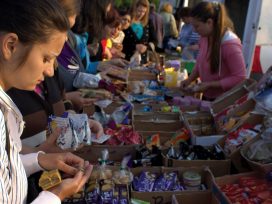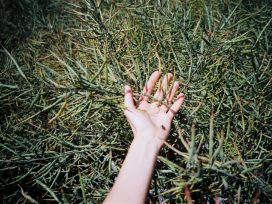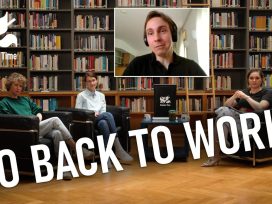Landfills on sale
How can the consumer enjoy an ethically sourced piece of fashion, when most garments are produced in sweatshops and soon end up in landfills anyway? A designer from India, a Romanian investigative journalist, and an Austrian ecotoxicologist discuss this on the new episode of Standard Time.
Approximately 80 billion pieces of clothing are consumed every year, with almost 85% of that amount ending up in landfills annually. This impacts the entire globe with increased carbon emissions and toxic waste dumped into bodies of water. The communities living in the affected regions bear the brunt of these adverse effects. Garment workers, furthermore, are subjected to horrible working conditions, and often work below the poverty line.
With the rise of consumers’ awareness and worker protests, many companies turn to greenwashing to promote themselves as sustainable, while continuing their exploitative practices. Yet activists and NGOs refuse to settle for pretence: they want to structurally challenge the fast-fashion industry. They lobby for stricter legislation, industry transparency, and propose alternatives that allow us to reimagine how we consume the clothes on our backs.
The space for ethical designers seems to be ever-shrinking, but many remain hopeful. We ask our guest speakers about the possibilities of building a sustainable fashion industry where creative cooperation and style can still thrive.
Gertrude Klaffenböck received her diploma in Agricultural Economics from the University of Natural Resources and Life Sciences (BOKU) in Vienna, and later a Master’s of Science in Ecotoxicology & Environmental Management at the FH Technikum Vienna. After a long career in both Südwind and FIAN Austria, she now works as a coordinator for the Clean Clothes Campaign, which aims to improve labour rights in the global clothing industry.
Laura Ștefănuț is a Bucharest-based investigative journalist, and a 2019 Milena Jesenská fellow at the Institute for Human Science, Vienna. She is also the founder of haine CURATE, which provides legal assistance to garment workers in Romania and informs them about their rights. Her stories about the Eastern European garment industry have appeared in outlets like Reuters, Balkan Insight, and Arte TV, and she is currently working on a book about EU garment workers.
Meha Jhajharia is a Kolkata-Vienna-based multimedia visual artist currently doing their Master’s in biomathematics at the University of Vienna. They research methods of using climate change trajectories to track developments in political movements with the help of mathematical modeling. Meha is also the co-founder and organizer of Spice Mixers, a Vienna-based collective dedicated to curating dance floors for QTBIPOC diaspora.
We meet with them at The Alte Schmiede Kunstverein, Vienna.
Creative team
Réka Kinga Papp, editor-in-chief
Merve Akyel, art director
Szilvia Pintér, producer
Zsófia Gabriella Papp, digita producer
Salma Shaka, writer-editor
Priyanka Hutschenreiter, project assistant
Management
Hermann Riessner, managing director
Judit Csikós, project manager
Csilla Nagyné Kardos, office administration
OKTO Crew
Senad Hergić, producer
Leah Hochedlinger, video recording
Marlena Stolze, video recording
Clemens Schmiedbauer, video recording
Richard Brusek, sound recording
Postproduction
Milan Golovics, dialogue editor
Nóra Ruszkai, video editor
István Nagy, post production
Art
Victor Maria Lima, animation
Cornelia Frischauf, theme music
Captions and subtitles
Julia Sobota, Daniela Univazo, Mars Zaslavsky, Marta Ferdebar, Olena Yermakova, Farah Ayyash
Hosted by
The Alte Schmiede Kunstverein, Vienna.
Related reads
Made in the EU:Why workers are fleeing Romania’s garment industry by Laura Stefanut, Eurozine.
Sources
Fast Fashion Getting Faster: A Look at the Unethical Labor Practices Sustaining A Growing Industry by Emma Ross, GW ILPB.
Violent wage protests in Bangladesh could hit top fashion brands by Vanessa Yurkevich, CNN.
Fashion greenwash: how companies are hiding the true environmental costs of fast fashion by Helle Abelvik-Lawson, Greenpeace.
Disclosure
This talk show is a Display Europe production: a ground-breaking media platform anchored in public values.
This programme is co-funded by the Creative Europe Programme of the European Union and the European Cultural Foundation.
Importantly, the views and opinions expressed here are those of the authors and speakers only and do not necessarily reflect those of the European Union or the European Education and Culture Executive Agency (EACEA). Neither the European Union nor the EACEA can be held responsible for them.

Published 25 April 2024
Original in English
First published by Eurozine
© Standard Time / Eurozine / Display Europe
PDF/PRINTNewsletter
Subscribe to know what’s worth thinking about.
Related Articles

The difference between knowing from distance that war is being waged and living that reality couldn’t be more extreme. But can awareness of multiple repercussions turn protective disassociation from violence into active solidarity? ‘The Most Documented War’ symposium in Lviv, Ukraine, provides valuable pointers regarding engagement and responsibility.

The visions of an apocalypse peddled by nihilistic humanists and misanthropic transhumanists confuse the destruction of humankind with salvation.





